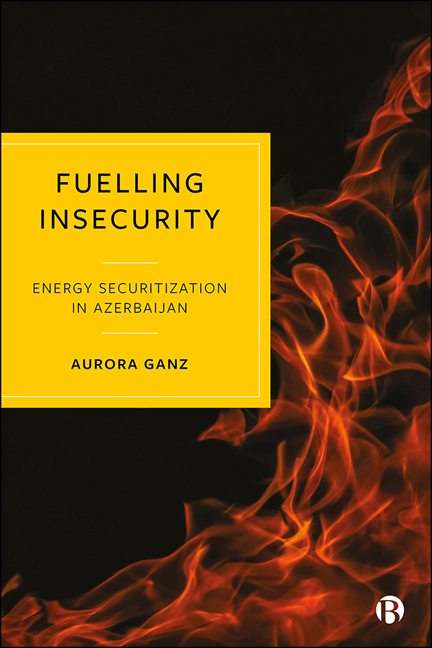Book contents
- Frontmatter
- Dedication
- Contents
- 1 Introduction
- 2 An Analysis of Actually Existing Energy Securitizations
- 3 Energy Securitization in the Land of Fire
- 4 Everyday Practices of Energy Security in Azerbaijan
- 5 Beyond the National Borders: NATO and Energy Security in Azerbaijan
- 6 Energy Securitization and the Private Sector: The Case of BP
- 7 Energy (In)Securitization: Abusive Security Practices and Poor Energy Choices
- 8 Conclusion
- References
- Index
4 - Everyday Practices of Energy Security in Azerbaijan
Published online by Cambridge University Press: 13 May 2022
- Frontmatter
- Dedication
- Contents
- 1 Introduction
- 2 An Analysis of Actually Existing Energy Securitizations
- 3 Energy Securitization in the Land of Fire
- 4 Everyday Practices of Energy Security in Azerbaijan
- 5 Beyond the National Borders: NATO and Energy Security in Azerbaijan
- 6 Energy Securitization and the Private Sector: The Case of BP
- 7 Energy (In)Securitization: Abusive Security Practices and Poor Energy Choices
- 8 Conclusion
- References
- Index
Summary
In Azerbaijan, the creation of a highly institutionalized structure to deal with energy security started at the beginning of the 21st century, when investments transformed the national oil industry, and the newly gained independence initiated the process of state building. Interviewees recalled that until the late 1990s it was mainly police officers who patrolled energy facilities, especially to avoid oil thefts. After the signing of the Contract of the Century, the presence of military and paramilitary professionals in the country's energy sites proliferated. In the very early days of the negotiations for the BTC pipeline, security concerns drove much of the talks between the corporations, their countries of origin and Azerbaijan's government. To western investors, the short life of the republic, the political instability of the region, and the fresh memories of the Cold War tension raised serious concerns, especially regarding energy transport and the physical protection of the pipelines. The deal not only established the criteria for oil extraction and production, but also posed the question of the physical security of the growing industry and defined the state commitment to grant security. Investors requested the local government to provide more security guarantees. Since then, the government of Azerbaijan has set up a rich legislative corpus that defines and regulates the provision of security in and around the energy sites. This legislation has expanded the role of law enforcement agencies, enabled the deployment of military forces in and around all those energy sites that are deemed critical, and established ad hoc security bodies that are exclusively responsible for oil and gas security.
This chapter begins by mapping the national security actors that secure energy in Azerbaijan; it outlines their organization, structure, activities and tools to identify how energy security practices are performed in Azerbaijan. By focusing on the practices, this analysis moves beyond the rhetoric of the exception and recentres its focus on the everyday as the ordinary and routine aspect of energy securitization. The first argument that this chapter puts forward is that energy securitization has created a crowded sector of professionals with military, paramilitary and enforcement expertise. While the range of security practices is multiple and diverse, it is not always possible to draw clear boundaries between different institutions, mandates and even activities.
- Type
- Chapter
- Information
- Fuelling InsecurityEnergy Securitization in Azerbaijan, pp. 76 - 96Publisher: Bristol University PressPrint publication year: 2021

